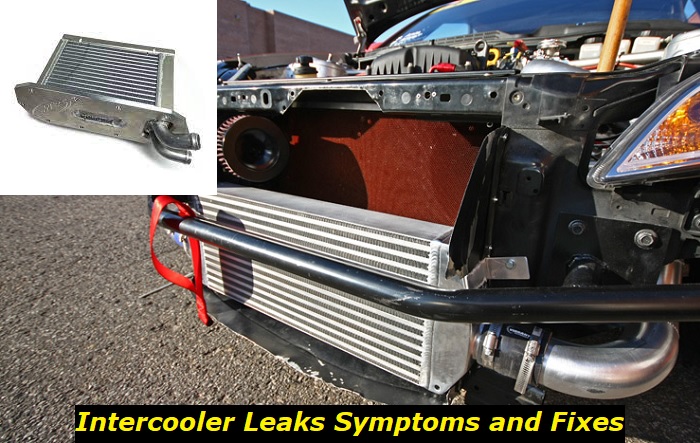The symptoms of intercooler leaking are bad performance, low boost, black smoke from the pipe, bad acceleration, sputtering engine, etc. Locating the problem is not that easy, so you will need professional help. Also, repairing the leaking intercooler almost always means replacing it.
Engine leaks highlights
- Level of importance:Medium
- Commonreasons:Problems with seals and gaskets, internal failures
- DIY inspection:Possible but complicated
- DIY repair:Mostly,impossible
- Price for repair:$150 - $650
- Can you drive?Only if the leak is minor
- Ways to fix:Replace the broken gasket or seal, replace the failed part

Intercooler - what's this and how it works?
Before I explain to you the symptoms of a broken or leaking intercooler, I want to give you a quick overview of what it actually is. This will help you filter all that bad information from the internet that comes from people who have never seen an engine bay in a car.
So, the intercooler, if explained simply, is another radiator that is mostly used in turbocharged vehicles. Not all turbo cars will have intercoolers, but there is no sense in using the intercooler in a non-turbocharged vehicle.
This part receives the hot air from the turbocharger. It's hot because the turbo is driven by exhaust gases that have only left the engine, so the air is extremely hot. Even though this air is mixed with the cold air from the air intake, the mixture is pretty hot to send it directly to the intake manifold again.
So, here's how the intercooler works (very simplified):
- it gets the hot air from the turbocharger in its intake;
- then the air is sent through a series of radiator sections to cool it down;
- the cool air is then sent to the pipe that leads to the intake manifold in the engine;
- when the turbocharger is not active, the intercooler just doesn't work.
As simple as that, the intercooler is just used to cool down the air from the turbocharger before this air enters the intake manifold in the engine. But the complication of its work is that the air from the turbo is always pretty hot and is sent to the intercooler under quite a high pressure.
Also, the intercooler may get some problems when the turbo is not working properly. For example. extensive oil leaks in the turbocharger may quickly contaminate the intercooler with oil and block it work. But it's not the only problem intercoolers can show.
Intercooler leaks - what are the symptoms
When I was looking at what other high-authority websites say about the symptoms of intercooler leaks, I found that they all claim overheating as the first symptom. But it's not true at all. Intercooler doesn't cool the engine, it cools the air that comes into the intake manifold. But even if this air is hot, it will not heat up the engine. This air then gets into the combustion chamber after being mixed with atomized fuel and burns. How on Earth can it raise the engine temperature?
Here are some true symptoms of intercooler leaks:
- poor boost - when air leaks from the intercooler, it lowers the pressure that the turbocharger creates and the boost pressure falls;
- poor efficiency of the engine - it seems that the turbocharger is not working or is working at half of its capabilities;
- gas mileage drop - your fuel consumption gets worse because the ECU compensates for under-boost and injects more fuel to keep the power high;
- strange sounds from under the hood - the air will leak under high pressure, so it may whistle or create other sounds;
- bad acceleration, especially at high RPM - the higher the engine revolutions, the more obviously you feel the problem of bad power.
That's how you detect a leaking intercooler in your vehicle. These symptoms can also tell you about some other problems, so using just symptoms to identify intercooler leaks is impossible. You will also need to check the boost pressure, check the turbocharger work, and then make the conclusion.
But sometimes, the leak can be felt just by your hand. The boost pressure in some vehicles is so high that the boost leak in the intercooler will most likely be felt under the hood of your car as a strong jet of air.
Can coolant leak from the intercooler?
Yes, intercoolers can also leak coolant if they are air-to-water intercoolers. Some cars will have air-to-air coolers that have only one working circuit with compressed air. Air-to-water intercoolers have two working circuits and one of them has engine coolant inside it. The coolant may leak just like in any other heat exchanger or radiator.
If you notice a coolant leak in your intercooler, remember that it doesn't affect the work of the unit. But you still need to solve the problem immediately because this can lead to low coolant levels and even worse leaks if ignored.
Why can your intercooler develop an air leak?
Now you know the symptoms and can identify that the intercooler is leaking in your vehicle. But why can this happen? What makes an intercooler leak air and deteriorate the quality of work of your engine?
I've compiled a list of the most common reasons for intercooler leaks. Here they are:
- Bad physical impact
One of the most common problems with the intercooler is that it can easily be damaged when you repair or maintain the engine. They are usually placed in such a way that they interfere with your movements. Without proper experience, you can easily damage the vulnerable intercooler with one of the tools you use for repair.
- Road debris
Also, the location of the intercooler is not always the most convenient in terms of potential damage from road debris. Your wheel can throw some stone or something towards the vulnerable intercooler radiator and it will start leaking air right after that.
- Blockages in the intercooler or hoses
If one of the pipes that are connected to the intercooler is blocked or the working circuit of the intercooler is clogged, excessive pressure may form and this will eventually damage the intercooler.
- Worn out turbocharger
A bad turbo will leak some oil into the boost pipe that's connected to the intercooler. This oil will partially go to the intake manifold and burn in the combustion chamber, but part of the oil will contaminate the intercooler and form high pressure in some parts of it.
Can you still drive when you notice the intercooler leak?
Driving with a broken intercooler for a long time is obviously not a very good idea. When the intercooler doesn't transfer all the pressure created by the turbocharger, the turbo will have to work much harder to compensate for the leak. It means that the turbocharger will be worn out much faster and may fail prematurely.
But you may drive at low RPM quite safely because, in most vehicles, the turbocharger doesn't create a lot of boost or doesn't work at all when the engine is in low revolutions. Also, you can drive the vehicle to the repair shop or the dealership without calling a tow truck.
But the safety of your driving for the expensive parts of the vehicle depends much on the degree of the problem. If the intercooler is torn apart and just sends all the air out, you will not be able to drive such a vehicle. In this case, you should better find some help and have the car towed to the dealership.
Can you repair the intercooler if it's leaking?
I am not a fan of different DIY methods of repairing radiators and intercoolers. People in different forums highly recommend JB Weld for repairing small openings in the intercooler. Well, you can use it but only temporarily - for a couple of weeks. It will not help you repair the intercooler permanently.
If your intercooler has a hole in it, the only good choice is to replace it. No way of repairing such a part will leave you satisfied for a long time. This part holds pretty high pressure at all times you are driving the car, so it needs to be absolutely ready to withstand pressure spikes and other common issues.
Final thoughts
Although intercooler leaks are not really common and don't happen too often in vehicles, you need to know about this problem. It can happen with any turbocharged vehicle equipped with this part because the intercooler is vulnerable to all kinds of damage and impacts.
I perfectly know that replacing the intercooler is the only way to solve the problem but you can try different DIY methods for temporarily fixing the part. Also, if you notice all the symptoms given above in this article, you will not always have problems exactly with the intercooler. These symptoms can also mean other problems with your vehicle and a good inspection is badly needed.
About the authors
The CarAraC research team is composed of seasoned auto mechanics and automotive industry professionals, including individuals with advanced degrees and certifications in their field. Our team members boast prestigious credentials, reflecting their extensive knowledge and skills. These qualifications include: IMI: Institute of the Motor Industry, ASE-Certified Master Automobile Technicians; Coventry University, Graduate of MA in Automotive Journalism; Politecnico di Torino, Italy, MS Automotive Engineering; Ss. Cyril and Methodius University in Skopje, Mechanical University in Skopje; TOC Automotive College; DHA Suffa University, Department of Mechanical Engineering






Add comment